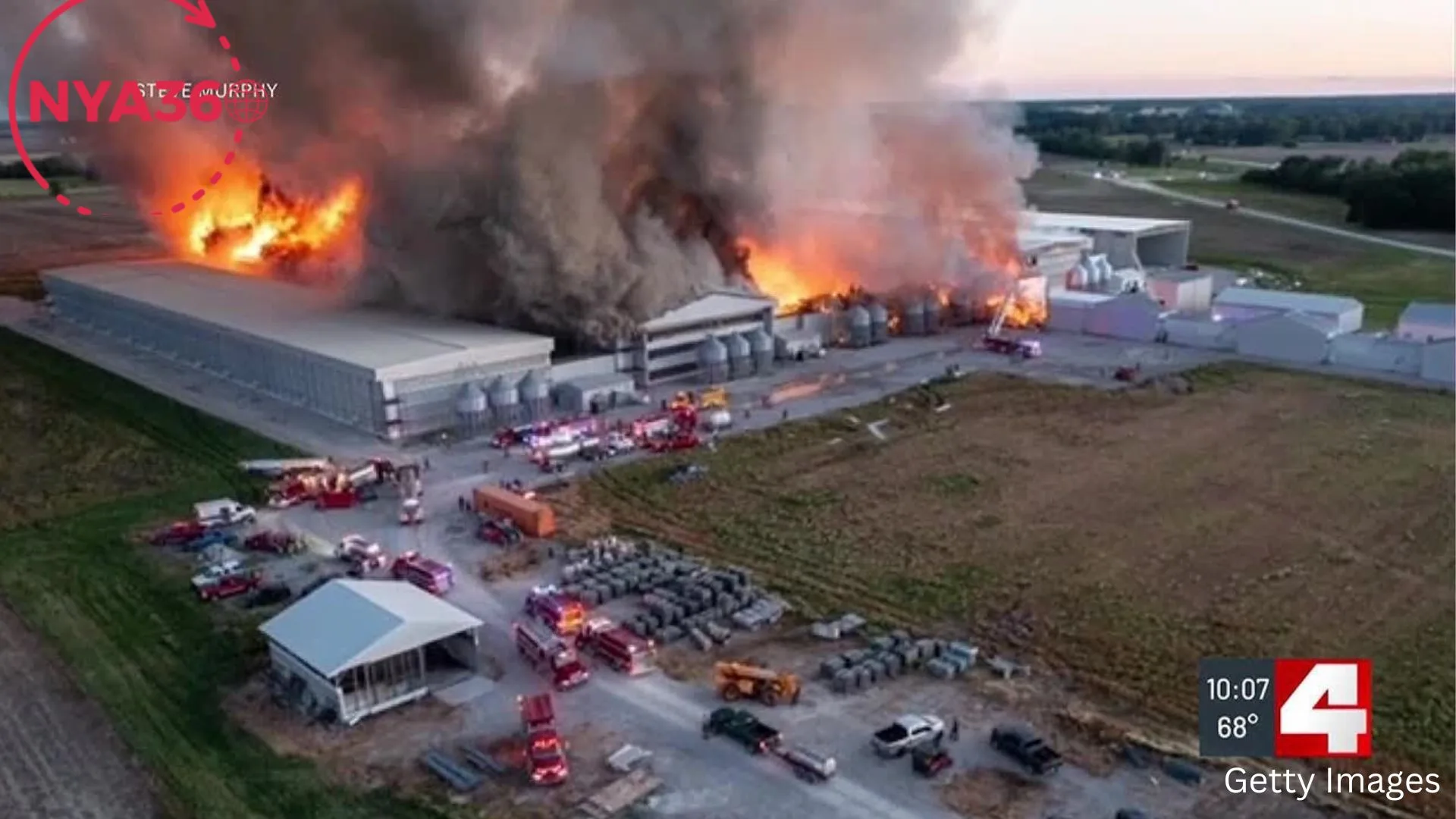A calamitous incident that has reverberated throughout the agricultural community occurred in Southern Illinois, where one of the most expansive free-range egg facilities in the United States was engulfed in a massive fire. Commencing late last night, the fire has claimed the lives of millions of poultry and destroyed millions of eggs, thereby presenting a substantial peril to the food supply chain.
A fire broke out at the expansive poultry farm, which was widely recognized for its substantial production of free-range eggs. As the establishment was consumed by flames, immediate response personnel from various counties raced to the location. Notwithstanding their commendable endeavors, the magnitude and ferocity of the fire rendered containment exceedingly challenging. It became evident in the wee hours of the morning that the devastation was widespread, as millions of chickens perished in the flames and innumerable eggs were destroyed.
The cause of the fire has not yet been ascertained by authorities. As investigations continue, agricultural experts and fire marshals examine the location for any hints. The precise causes of the incident are still unknown; however, it has already generated extensive apprehension and conjecture among agricultural professionals and beyond.
The loss of millions of chickens and eggs from this singular facility deals a substantial setback to an already troubled poultry industry. This specific farm was a prominent provider of free-range eggs and was renowned for its steadfast dedication to sustainable and humanitarian agricultural methods. The abrupt cessation of production capacity will inevitably cause supply chain disruptions, potentially resulting in egg and poultry product shortages and price increases.

As the industry has been contending with an outbreak of avian influenza, more commonly referred to as “bird flu,” the timing of this catastrophe is especially regrettable. To prevent the disease’s spread, thousands of birds have been culled throughout the nation as a result of the avian flu. When the fire-related losses are factored in, the overall effect on the poultry population becomes catastrophic.
Fire-related economic repercussions are anticipated to be extensive. In addition to making a substantial contribution to both local and national egg supplies, the poultry farm employed a considerable number of individuals. There will be concerns that must be addressed regarding the immediate loss of employment and the longer-term economic repercussions on the community and the supply chain as a whole.
A discernible impact on the accessibility and cost of poultry and eggs is what consumers can expect in the future weeks and months. The depletion of millions of eggs results in a direct reduction in supply, which will almost certainly cause prices to increase, according to fundamental economic principles. The avian influenza epidemic further complicates this predicament, as it further depletes the availability of nutritious poultry and eggs.
In addition to the logistical and economic ramifications, the fire gives rise to substantial concerns regarding animal welfare and the environment. The lamentable demise of millions of chickens serves as a poignant illustration of the susceptibilities inherent in contemporary agricultural methodologies and emergency response systems. Animal rights activists have consistently advocated for enhanced safety protocols and more humane treatment standards to be implemented in industrial-scale agriculture. Such demands will likely be renewed and heightened in response to this incident, which will likely spark conversations about how to protect facilities and animals from similar catastrophes.

As a consequence of the fire, attention has been redirected towards recovery and response. State and federal agencies, in conjunction with local authorities, are coordinating their endeavors to effectively manage the immediate aftermath. This encompasses the provision of assistance to workers who have been displaced, the evaluation of the ecological consequences, and the initiation of the challenging endeavor of remediation and reconstruction.
This incident serves as a poignant reminder to the agricultural sector at large regarding the criticality of implementing resilient disaster preparedness and response strategies. It is crucial to ensure that establishments are outfitted with the requisite safety protocols to avert and alleviate fire incidents. This encompasses routine safety inspections, efficient fire suppression systems, and thorough staff education regarding emergency protocols.
Furthermore, an increased emphasis is expected on research and investment in sustainable agricultural practices that prioritize environmental stewardship and animal welfare, as well as fire prevention technologies. By implementing the insights gained from this tragic event, industry-wide enhancements can be directed toward averting future occurrences of a similar nature.
The poultry industry is dealt a catastrophic setback by the massive fire at the Southern Illinois farm, which has far-reaching effects on the local economy, food supply, and animal welfare. While ongoing investigations strive to ascertain the origin of the fire, recovery and prevention efforts remain the primary concerns. Consumers, policymakers, and the agricultural community will need to collaborate to construct a more resilient, humane, and sustainable future for poultry farming and to address the immediate effects.
Follow us on social media: Instgram, Threads & Twitter X @nya360_ YouTube & Facebook @nya360.





